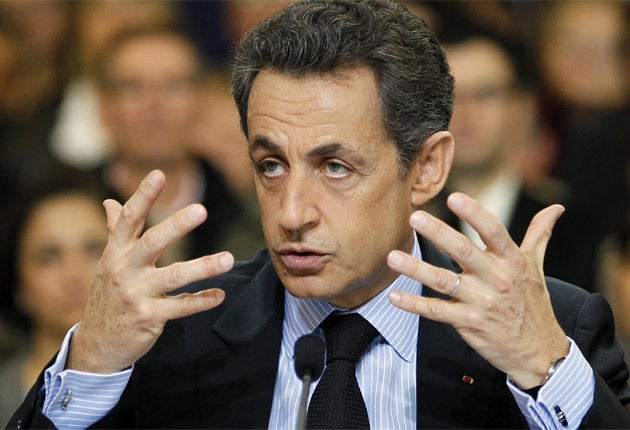Diplomats attack Sarkozy for 'amateurish' foreign policy

Your support helps us to tell the story
From reproductive rights to climate change to Big Tech, The Independent is on the ground when the story is developing. Whether it's investigating the financials of Elon Musk's pro-Trump PAC or producing our latest documentary, 'The A Word', which shines a light on the American women fighting for reproductive rights, we know how important it is to parse out the facts from the messaging.
At such a critical moment in US history, we need reporters on the ground. Your donation allows us to keep sending journalists to speak to both sides of the story.
The Independent is trusted by Americans across the entire political spectrum. And unlike many other quality news outlets, we choose not to lock Americans out of our reporting and analysis with paywalls. We believe quality journalism should be available to everyone, paid for by those who can afford it.
Your support makes all the difference.An anonymous group of French diplomats known only by the name "Marly" has hit out at Nicolas Sarkozy, calling the president's foreign policy impulsive, amateurish and preoccupied with the nation's image in the media.
The group, named after the Paris café where the diplomats first met, published the broadside in yesterday's edition of daily newspaper Le Monde. "The President treats the state administration with palpable contempt," wrote the diplomats. "He tries to make diplomats responsible for the nasty aftertaste of his own policies."
The writers, who according to Le Monde come from a cross-section of the diplomatic corps, say a WikiLeaks à la française would show that diplomats had written strongly critical notes about the ousted presidents of Tunisia and Egypt; it was the Elysée that decided to support Zine el-Abidine Ben Ali and Hosni Mubarak as "mainstays of the south", they said.
"Errors could have been avoided by listening to diplomats, errors caused by amateurism, impulsiveness and the short-term preoccupation with the image in the media," the group wrote.
The timing is painful for Mr Sarkozy: French diplomacy is in trouble on three fronts. The new ambassador in Tunis ran into problems less than a week into the posting when he stormed out of a press conference. Boris Boillon apologised on Tunisian television at the weekend after his outburst prompted protests calling for his resignation.
This came after a series of blunders by the Foreign Minister, Michèle Alliot-Marie: she offered France's help in putting down anti-Ben Ali protests and borrowed a plane from an associate of a relation of the Tunisian President during the uprising.
Prime Minister François Fillon, meanwhile, admitted two weeks ago to having borrowed a plane from Mr Mubarak over the new year, and Mr Sarkozy subsequently advised his ministers to take their holidays in France.
Adding to the diplomatic woes, the Mexican foreign relations department withdrew from the French Year of Mexico and criticised Mr Sarkozy last week after the president said he wanted to use the Year of Mexico to air the case of Florence Cassez, a Frenchwoman sentenced to 60 years in prison for kidnapping in Mexico. "It is really surprising that a head of state would make a foreign policy decision that affects ties between two nations and governments in consultation with a person condemned by Mexican justice for a particularly serious crime," the department said.
The Marly group said: "The tension with Mexico is the result of giving a public airing to a dossier that should have been treated with discretion."
Analysts say France's foreign policy is no longer taken seriously, especially in North Africa. "In the past five years, French diplomacy has lost all currency and prestige with Sarkozy's frenetic approach," said Professor Andrew Hussey, who is writing a cultural history of France and the Islamic world. "France has poured investments into companies in Morocco, but the money only flows back to France. There's no sense of mutuality or collaboration."
Relations with Algeria are worse, where French business interests help to prop up the government, but where ordinary Algerians can't get visas to come to France, Mr Hussey added.
The government has dismissed Marly's accusations. "It's a political pamphlet," Mr Sarkozy's special adviser Henri Guaino told the radio station France Info. "There is no argument, just snap judgements. It shows that the electoral campaign has begun."
Join our commenting forum
Join thought-provoking conversations, follow other Independent readers and see their replies
Comments